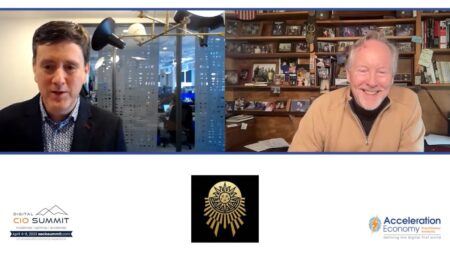In this Metaverse interview, Toni Witt speaks with Tony Vittilo, a freelance Metaverse consultant and XR developer at ImmotionAR, about the future of the Metaverse, augmented reality (AR), and virtual reality (VR).
Highlights
00:08 — Having been in the AR and VR space since 2014, Tony Vittilo currently works as a consultant.
01:04 — Vittilo has always been interested in the multimedia aspects of computing. During his thesis, he was interested in “adding metal objects to the albedo,” which led him to form a partnership with a classmate to create a startup. He recalls deciding he wanted to do this for the rest of his life after using Google Glasses and finding that he was able to essentially teleport to another world.
02:55 — Toni asks for Vittilo’s perspective on what the word Metaverse means and what he considers to be the vision for it. Vittilo strays from using the “m-word” because its meaning has been lost in translation as a result of its increasing popularity. The vision of the Metaverse requires a total cancellation of the barrier between the real world to create a constant mixed reality. The vision entails giving individuals the constant choice between digital and real, but in a natural way.
05:50 — What major hurdles must be overcome to reach the large-scale adoption of this vision? As someone who considers himself a “tech guy,” Vittilo observes the technical, software, and social difficulties of reaching this vision. He is hopeful that the Metaverse, AR, and VR will be accepted into the mainstream in the same way that digital forms of communication and collaboration were amidst the pandemic.
10:14 — What are the major pain points in working with organizations to create immersive technologies? Companies lack the understanding of what they can truly accomplish with the Metaverse. Many companies are interested in the future possibilities the Metaverse holds but are unsure how to apply it. Since it’s difficult to project the related costs of these expensive ever-changing technologies, companies are weary of the costs associated with the Metaverse. By defining what the Metaverse can currently do for companies and outlining what the next 15 years hold, organizations will be better able to fully grasp its impact.
14:52 — What industries are on the horizon in terms of integrating AR and VR? These technologies can be useful in every field, but manufacturing, education, and sports are industries that require a real application of technology, shares Vittilo. The agriculture industry has been experimenting with some of these technologies, too.
17:15 — For companies that may be on the fence about AR and VR technologies, they should speak with an industry professional, such as Vittilo. This will help them to better understand the potential of the technology as well as know whether or not it can truly benefit the organization. They must also be very practical and concrete, says Vittilo, and define their end goal with these technologies.
Want to compete in the Metaverse? Subscribe to the My Metaverse Minute Channel:











